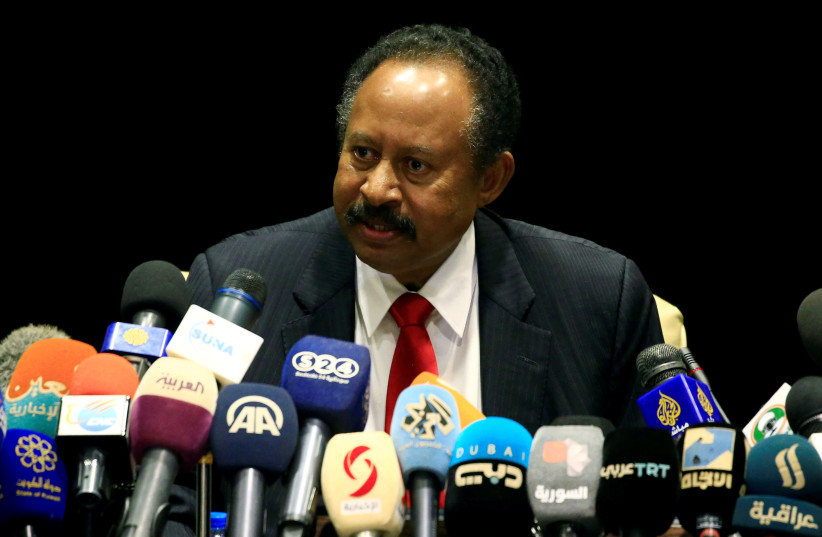The military has been deployed in Sudan’s capital of Khartoum amid rising tensions in the country and protests. Concerns are that a military coup is underway. Pictures circulating online show arrests and other incidents. Sky News Arabia and other Arabic channels have reported the presence of the military.
This is important for the region, and could also affect Sudan’s relations with Israel because it was one of the countries that joined the path to normalization in the wake of the Abraham Accords.
According to reports, Prime Minister Abdallah Hamdok was placed under house arrest. The Associated Press said that at least five government officials were put under house arrest, including the prime minister. Bridges and roads around Khartoum were closed, Al Arabiya said.
Jared Szuba at Al-Monitor noted that the report of the apparent coup comes a day after Jeffrey Feltman, US special envoy for the Horn of Africa, had met with Abdel Fattah Burhan and Mohamed Hamdan Dagalo, known as “Hemedti.” These two have since 2019 been the head and deputy of the Sovereignty Council, the key military and leadership position created after the fall of the former Sudanese government of Omar al-Bashir.
Burhan became the leader of Sudan and Hamdok his prime minister. The concept was that Sudan would move toward civilian rule. However, forces in the country have continued to struggle under the surface, between supporters of the old Muslim Brotherhood regime and those who wanted a more secular democracy.

In the region, Sudan was an outlier in trying to shift toward civilian rule. After the Arab Spring, many of the hopes for civilian rule were dashed. Tunisia did transition to democracy, but other countries like Egypt suffered chaos and coup and became more authoritarian. Syria is still suffering a civil war.
Rival powers – like Turkey, which backs the Muslim Brotherhood, and Saudi Arabia, which opposes it – have led to contests throughout the region, from Libya to Tunisia.
Other countries have suffered from Iranian-backed groups that tried to seize power in Yemen, Lebanon and Iraq. Monarchies have continued to thrive in the Gulf and in Jordan.
Sudan, therefore, was left not only poor but also potentially as a state full of underlying struggles for the nature of the region. It is seen as an Arab state, despite being in the Horn of Africa, and has played a role in Arab nationalist and religious politics. Turkey had sought to increase its role there in the last decade; Egypt now wants key allies in Sudan.
According to Al-Ain media, the Sudanese Professional Association has called its supporters to the streets after news of the arrests was publicized. Reuters quoted a witness that Internet services were disrupted in the Sudanese capital, Khartoum.
“Sudan is living in the midst of a severe political crisis following the escalation of the dispute between the military and civilian partners of the transitional period, amid the absence of a solution horizon in light of each party’s adherence to its position,” the report said at Al-Ain.
“The military and their supporters, camping in front of the presidential palace for the tenth day in a row, are calling for the dissolution of the transitional government, the formation of other national competencies, the dissolution of the Brotherhood’s dismantling committee, and the expansion of the base of participation in the ruling coalition,” it said, “while the Alliance for Freedom and Change rejects these demands, and considers the movement in front of the presidential palace as attempts to attack the revolution.”
Reports also noted that the incident took place after the visit of the US envoy, and that the home of Hamdok’s media adviser was stormed by troops. On October 2, Feltman was also in Sudan.
“In his meetings with Prime Minister Abdalla Hamdok... members of the Cabinet, Sovereign Council Chairman Abdelfattah al-Burhan, members of the Sovereign Council and other political stakeholders, Special Envoy Feltman expressed the United States’ dedication to continued political and economic support as Sudan’s transition proceeds,” the US State Department said.
“He also underscored that such support depends on Sudan’s adherence to the agreed transitional order as established in the 2019 Constitutional Declaration and the 2020 Juba Peace Agreement.
“Deviation from this path and failure to meet key benchmarks will place at risk Sudan’s bilateral relationship with the United States, including significant US assistance, as well as the prospect of security cooperation to modernize the Sudanese armed forces and US support in the International Financial Institutions and for debt relief.”
On October 24, Voice of America reported the second recent Feltman visit. It noted that hundreds of thousands of people had been protesting for civilian rule.
The US “envoy underlined Washington’s support for a democratic transition to civilian rule in Sudan on Saturday during talks with the head of its ruling council and the prime minister,” said the US embassy in Khartoum.
In the VOA report, Feltman was said to have “urged all sides to recommit to working together to implement Sudan’s constitutional declaration, signed after a 2018-2019 uprising that resulted in the removal of president Omar al-Bashir.”
Feltman had met with the generals and the head of the Sovereignty Council.
“Tensions between the civilian and military leaders who now share power have soared in the wake of an attempted military coup in September, which the army said it had foiled,” said the report.
